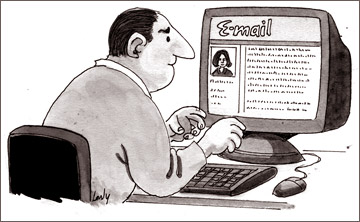Internet viewed differently by men and women

Do men and women look at the Internet with different eyes? Is the
Internet inherently biased? Web’s promise of broad-based access looked
far-flung judging by inequalities that had sprung up?
Most social networks like Facebook, Twitter, MySpace and Jezebel
seemed popular with women while Wikipedia the free encyclopedia showed
an 85 percent male participation. That disparity - a statistical
impossibility - could not be fathomed.
|
Role
* Facebook, Twitter, My
Space popular with females
* Wikipedia popular with
males
* Facebook tone more civil
* Internet search engines
depositories of knowledge
* Wikipedia helps construct,
share knowledge |
 Wikipedia’s over 3.5 million articles in English were fed by more men
85 to 15 percent even though there was unrestricted access to edit
articles - easy instructions for editing were provided. The Wikipedia
Foundation seemed determined to increase female participation to 25
percent by 2015. Wikipedia’s over 3.5 million articles in English were fed by more men
85 to 15 percent even though there was unrestricted access to edit
articles - easy instructions for editing were provided. The Wikipedia
Foundation seemed determined to increase female participation to 25
percent by 2015.
What accounted for this imbalance? The domination by male-editors
inputting Wikipedia site came to be extensively scrutinized. Why such
preponderance occurred looked a little baffling.
Fight to dominate critical mass
Critical mass defined the minimum numerical strength needed for a
group in a social system to generate a well-balanced thought process. A
group’s small size tended to make its representation a mere token. The
larger the group, the better its ability to sustain the momentum towards
further growth.
Many felt that the ascendancy struggle within the Wikipedia among
peers stemmed from belligerent communication styles of editors and the
contentious clash over use of language, content and thought process -
the critical mass itself.
Facts and concepts were challenged, not always using the most polite
vocabulary - thus contents tended to be swayed by males. Internet
attracts inflammatory anonymity adding fuel to the fire - by no means a
friendly peer review process. Such environs seemed unappealing to many
women.
The lecturing tone seemed commonplace: a simple statement like
“Indo-Aryan language derived from an earlier Proto-Indo-Iranian stage” -
would immediately lead to prolonged discussions.
Matching wits in social networking
Social networking sites like Facebook provided a contrasting
difference as the tone seemed civil. Women were more immersed in the
process and not put off by the tone of the discussions elsewhere. They
could match wits with anyone in social networking.
Social networking is more leisurely and less inhibiting - sharing
became the underlying motivation. Women excelled at nurturing and
building bridges.
Internet search engines became exhaustive depositaries of knowledge
and its underlying broad-base approach seemed laudable. Yet the jostle
to get a point of view across incurred a punchy push and shove: the
fight to get one’s voice heard favoured those with muscle. Editing is
unnerving because it conveys an attempt to tidy up what someone had
spent hours constructing. The hassle to cancel each others’
contributions out and deciphering the conflicting points of view and
accuracy of facts were maddening.
Turf battle ethics
Others would argue that defending the turf or one’s point of view was
what writing constituted. Search engines also tend to attract more
vigorous input than the social networks.
Wikipedia made a valiant effort to keep to high standards for
research to make it available to all people through a social and
collaborative process of knowledge construction. Yet a concept may have
to be defended and a position may need to be protected against others
who seek to wipe all. Women definitely would not shy away from any
confrontation in any one-on-one basis. They are quite expressive and
possess equal ability to work collaboratively to construct bodies of
knowledge as men. They defended their point of view quite well. Strict
debate guidelines seemed one way to ensure full participation of all -
or else the turf battle would detrimentally limit valuable input.
|



